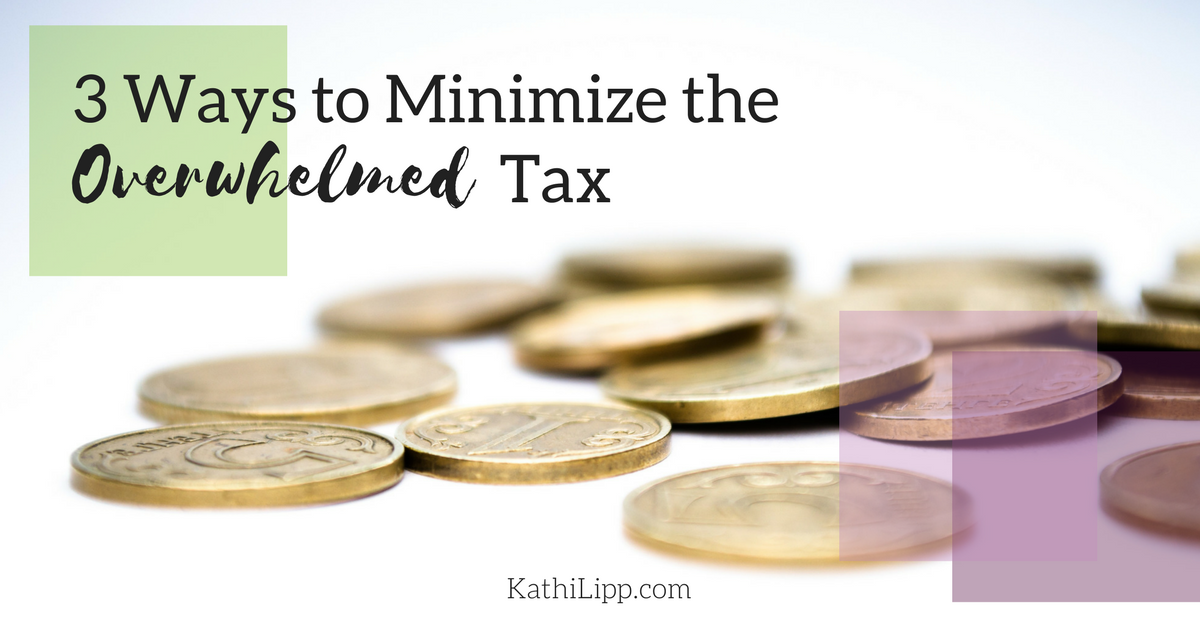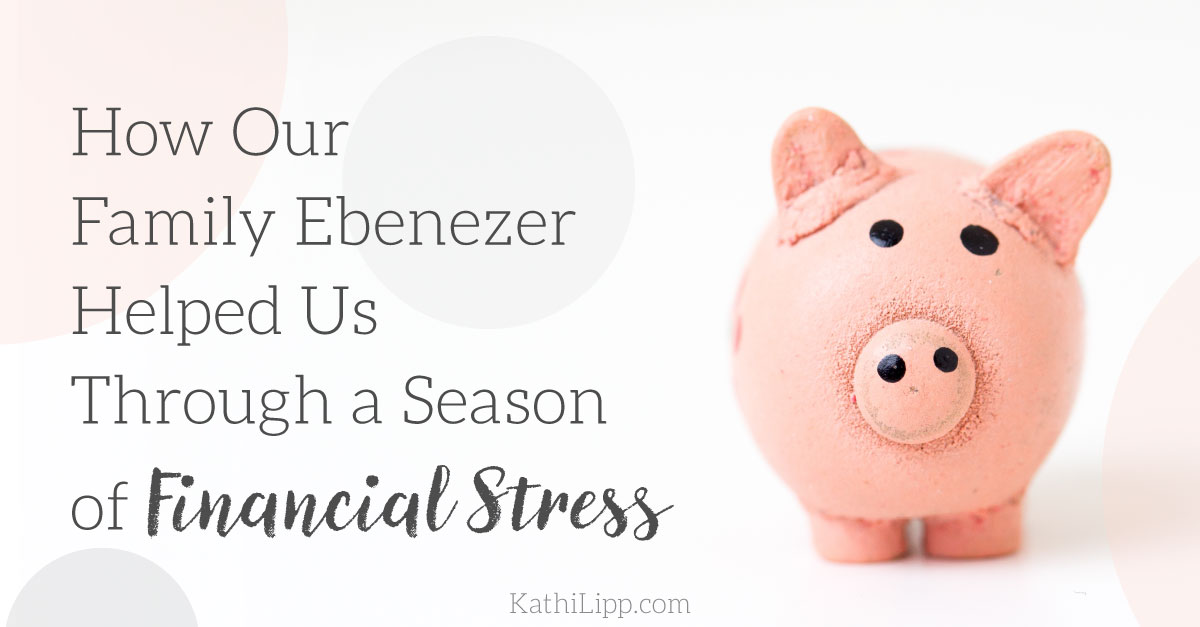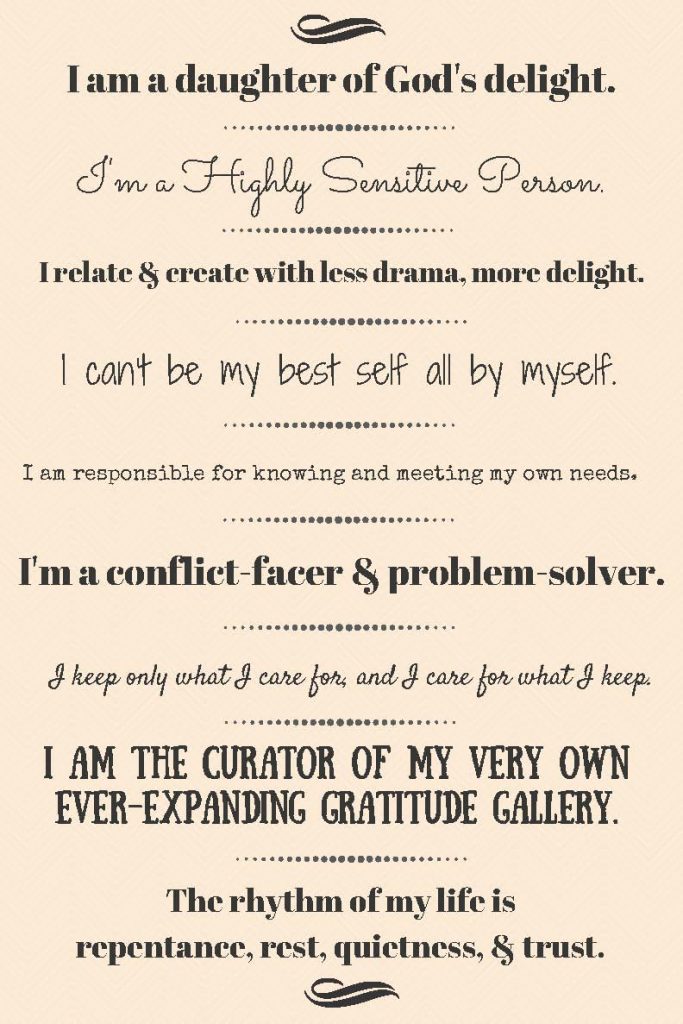
by Guest Blogger | Jan 13, 2017 | Blog, Overwhelmed |

“We all pay an Overwhelmed tax,” Kathi tells me.
To myself, I think: Well, maybe you do, but I’m sure I don’t.
Aloud, I say: “How interesting!”
Kathi gives an illustration of adding a service to her cell phone during a trip and then forgetting to cancel it. This resulted in paying months of unnecessary extra charges.
Again, I think to myself: Well, maybe you do that kind of thing, but I’m sure I don’t.
Overwhelmed Tax: The Dental Work Payment
Later in the week, I visit my dentist who kindly but honestly informs me since I’ve waited so long to see him, what could have been a filling now needs to be a crown … possibly a root canal.
I start to throw myself a pity party.
This is so unfair. I work so hard. I’m so busy. I don’t have time to …
Kathi’s words interrupt my thoughts: “We all pay an Overwhelmed Tax.”
And I wonder: Do I pay an Overwhelmed Tax, after all?
Overwhelmed Tax: The Plane Ticket Fee
A few weeks later, I add an item to my to-do list:
“Book a return flight for Annemarie.”
I check the price online: thanks to a special deal, it’s under $100.
Whew!
Days pass.
“Book a return flight for Annemarie” stays on my to-do list.
Weeks pass.
Finally, I put, “Book a return flight for Annemarie” on my calendar.
When I go online, I find that the ticket price has doubled.
I start to kick myself for being so …
… so what? Lazy? Hardly. I’ve been busy. And sick.
Kathi’s words return: “We all pay an Overwhelmed Tax.”
And instead of wallowing in denial, persecution, or punishment, I accept the truth:
Today, I’m paying a hefty Overwhelmed Tax to Southwest Airlines.
Overwhelmed Tax: The Acute Pneumonia Fallout
It’s one week before Christmas, and I’ve been sick for nine weeks straight.
Two months ago, I determined to soldier through my many commitments. But the worse my cough became, the more I had to cancel.
I finally do what I should have done long ago: take myself to Urgent Care. I emerge with a diagnosis of pneumonia, a prescription for antibiotics, and doctor’s orders to rest.
By Christmas Eve, my symptoms are almost gone, and my strength is returning.
On the way home, I begin to tally up the Overwhelmed Tax I’m paying because I failed to seek medical care early on.
• A bunch of time-sensitive projects are way behind schedule.
• My family has had a grouchy, lethargic wife and mom for way too long.
• I have neither rested well or worked well nor played well for two long months.
All because I was too overwhelmed—by busyness, by annoyance, and even by pride—to make the choice to see a doctor sooner.
Minimizing the Overwhelmed Tax Damage
I now agree with Kathi: We all pay an Overwhelmed Tax.
(And if you’re tempted to tell yourself, “Well, maybe you do, but I’m sure I don’t,” think again!)
One Small Win: Here are three effective ways we can minimize the Overwhelmed Taxes we pay:
1. Audit the Overwhelmed Tax you pay. Start keeping track of the various ways you pay Overwhelmed Tax. Money isn’t the only kind of cost—often, it’s the least of our expenses! An Overwhelmed Tax can be exacted on your time, your energy, your space, your relationships, and your integrity.
2. Avoid paying Overwhelmed Tax when possible. Take the ten minutes to book the plane ticket while the price is low. Hire help: it feels so much more satisfying to pay others for their skills than to pay an Overwhelmed Tax (which feels like failure.)
3. Accept that we all pay an Overwhelmed Tax. When you can’t avoid an Overwhelmed Tax, give yourself grace. Learn what you can move on. The steepest Overwhelmed Tax on earth is failure to forgive—it’s far too high a price to pay for anything.
Which one simple step will you take today?

 Cheri Gregory is a teacher, speaker, author, and Certified Personality Trainer. Her passion is helping women break free from destructive expectations. She writes and speaks from the conviction that “how to” works best in partnership with “heart, too.” Cheri is the co-author, with Kathi Lipp, of The Cure for the “Perfect” Life and the upcoming Overwhelmed. Cheri has been “wife of my youth” to Daniel, her opposite personality, for twenty-eight years and is “Mom” to Annemarie (25) and Jonathon (23), also opposite personalities. Cheri blogs about perfectionism, people-pleasing, highly sensitive people, and hope at www.cherigregory.com.
Cheri Gregory is a teacher, speaker, author, and Certified Personality Trainer. Her passion is helping women break free from destructive expectations. She writes and speaks from the conviction that “how to” works best in partnership with “heart, too.” Cheri is the co-author, with Kathi Lipp, of The Cure for the “Perfect” Life and the upcoming Overwhelmed. Cheri has been “wife of my youth” to Daniel, her opposite personality, for twenty-eight years and is “Mom” to Annemarie (25) and Jonathon (23), also opposite personalities. Cheri blogs about perfectionism, people-pleasing, highly sensitive people, and hope at www.cherigregory.com.

by Guest Blogger | Jan 12, 2017 | Blog, Love Your Husband, Marriage, The Husband Project |

Why can’t my husband be more like me? I don’t need reminders. I see how dirty the floor is, and I put things back where they belong to make life easier for the next person.
If only my husband were more like … me!
Life sure would be easier if my husband saw these things like I see them, take action, and think ahead. Our marriage would be a whole lot better if he were more like … me.
I’ve had these thoughts more often than I’d like to admit. I am really good at seeing how the world looks through my eyes. But even if I had perfect vision, which I don’t, my narrow vision often blinds me from seeing the good in how my husband navigates life.
Why different vision is better
When I forget my husband sees the world through different eyes, I easily start feeling overwhelmed with a desire to make him more like me. When I get wrapped up in feeling certain that my way is the best way, I end up thinking that my husband’s ways are flat-out wrong.
And when I start thinking my husband’s ways are wrong, I’ve lost sight of his strengths.
A Dance For Two
The reality is (and the research shows) women are great at tackling many things at once. While men are skilled at focusing their attention on one thing at a time.
While it’s easy to raise our hands and do a victory dance at how us gals can talk on the phone, write out the grocery list, put dinner together, and change a diaper all at the same time. Our husbands get to do a victory dance of their own. As proud as we are of how God made us, we would be wise to also celebrate how God made our husbands.
We find joy when we intentionally find the good in something that frustrates us.
Being intentional
One Small Win: Today, think of one thing you typically wish your husband would do differently. Tell him (or text, call, or write him a note) that you are thankful he does this thing differently than you. (And, for extra credit, tell him why).
For example: I wish my husband would put his dirty clothes in the basket and do the laundry. “Honey, I am thankful that you don’t feel the need to be as tidy as I am. Sometimes, I don’t like that I am so hard-wired to be such a neat freak. I don’t appreciate enough that I could learn a thing or two from how laid back you are in this area. I may just forget about the laundry tonight and join you in watching a show.”
Embrace The Differences
Husbands tend to be better at loving us as we are. They typically don’t spend their lives trying to make us more like…them.
Imagine a marriage where your husband feels comfortable not having to do everything according to your version of “right”.
Imagine intentionally trading in your thoughts of disappointment and resentment toward your husband for thoughts of celebration and love.
What one thing will you celebrate about your husband today?

 Amanda Davison is on a mission to share how her education in counseling and God’s word changed her marriage. She is sure to share personal, laugh-out-loud moments, which are woven with challenging yet inviting perspective change. As a speaker and wife coach, she tackles topics such as, becoming a confident wife, handling the real frustrations as wives, knowing and owning our high call as wives, and obedience. She wants to hear from you and hopes you will join with her on the journey of learning to love God’s people well.
Amanda Davison is on a mission to share how her education in counseling and God’s word changed her marriage. She is sure to share personal, laugh-out-loud moments, which are woven with challenging yet inviting perspective change. As a speaker and wife coach, she tackles topics such as, becoming a confident wife, handling the real frustrations as wives, knowing and owning our high call as wives, and obedience. She wants to hear from you and hopes you will join with her on the journey of learning to love God’s people well.
Learn more about Amanda at www.amandadavison.com.

by Guest Blogger | Jan 8, 2017 | God, Guest Blog, Overwhelmed |

I was sick when I was pregnant and not just a little bit. Doctors diagnosed me with hyperemesis, which I loosely translate into “throwing your guts up day and night.”
When I got pregnant the second time, people assured me every pregnancy is different. And they were right. The second time was worse.
I sank into despair
For a woman who had led a largely sheltered and happy life, the sickness and helplessness overwhelmed me. Even though I knew the suffering would end with a blessing, my baby boys, I drifted from discouragement to despair. And then I sank. I also followed a harmful pattern that made everything worse. For the first time since I had fallen madly in love with Jesus, I didn’t pray. I didn’t read my Bible. Instead, I withdrew from God.
Just a month after my second son was born, I developed a close friendship with a woman named Linda whose sons were the same age as mine. We were both sick during our second pregnancy, but her nausea had a different source. It was caused by the chemo she was receiving for a rare and aggressive form of breast cancer.
Faced with a terminal illness, a new baby, and a grieving family, my friend didn’t react to overwhelmed by pushing God away. She drew close to Him.
In her truly overwhelming circumstances, she administered David’s remedy given in Psalm 62:8, “Trust in him at all times, you people; pour out your hearts to him, for God is our refuge.” (NIV, emphasis added)
What my friend taught me about seeking God
Instead of withdrawing from God like I did, Linda’s secret was that she withdrew each day with God. Linda brought all her emotions to God and let Him help her. She didn’t try to fake cheerfulness in His presence or avoid Him completely. Instead, she trusted Him with her feelings and found Him to be her refuge.
If you’ve made my mistake and developed a pattern of withdrawing from God instead drawing close, I have an action step for us to take. Let’s set a reminder on our phone or a write a note on our calendar each day at a specific time that says, “Pour out your heart to Him.” When our daily time arrives, let’s take the next five minutes to bring our honest feelings to God and ask Him to help us with them.
Creating a new pattern of withdrawing to Jesus in overwhelmed times instead of hiding from Him means we access His power, strength and peace to face the day. We’ll not only build deeper trust in God, but just like my friend Linda, we’ll strengthen and inspire others.
One Small Win: In the past, have I responded to overwhelmed by withdrawing from God or with Him? What steps can I take to either change or strengthen that pattern?

 Amy Carroll is a speaker and writer for Proverbs 31 Ministries. She’s the author of Breaking Up with Perfect as well as the director and coach of Next Step Speaker Services. Amy and her husband live in lovely Holly Springs, NC with a bossy miniature dachshund. You can find her on any given day texting her two sons at college, typing at her computer, reading a book, or trying to figure out one more alternative to cooking dinner. Share life with Amy at www.amycarroll.org and on Facebook.
Amy Carroll is a speaker and writer for Proverbs 31 Ministries. She’s the author of Breaking Up with Perfect as well as the director and coach of Next Step Speaker Services. Amy and her husband live in lovely Holly Springs, NC with a bossy miniature dachshund. You can find her on any given day texting her two sons at college, typing at her computer, reading a book, or trying to figure out one more alternative to cooking dinner. Share life with Amy at www.amycarroll.org and on Facebook.

by Guest Blogger | Jan 6, 2017 | Blog, Finances, Guest Blog, Overwhelmed |

by Amberly Neese
Money stinks.
Don’t get me wrong I appreciate the freedoms and opportunities money can afford, but the lack of it is draining.
My husband and I have been in full-time ministry for most of our lives. Budgeting has been a necessary reality since the beginning of our union. Dental bills, unexpected car repairs, medical issues, and the cost of everyday life created stress for us in various seasons but nothing could have prepared us for nine months of unemployment.
The cost of unemployment
We had just moved so I could accept my dream job at a Christian camp in the mountains of Arizona. I left teaching, took a pay cut, and trusted God’s call. Everything was awesome until my husband started looking for a job. He has a Master’s Degree from USC (on a full ride), decades of experience, and, frankly, he is a good guy. Nothing. No one seemed to have a need for that which he had to offer. It was arduous.
The tension in our home with our teenagers and between my husband and I became palpable. An increase in raised voices and shed tears precipitated a change. That change came in the form of a trip to the dollar store (God bless the dollar store).
We bought polished rocks, a candle, and a Sharpie. I pulled out an old glass hurricane lamp and charger plate from the garage and got to work. I put the candle in the middle of the charger plate, placed the hurricane over the candle and spread the rocks all around the outside of the glass. Then I called a family meeting where I told everyone anytime we felt overwhelmed or frustrated, we needed to contribute to our family’s ebenezer.
A family ebenezer
Ebenezer is more than the name of the lead character in that old Christmas story. It comes from the name of a stone raised by Samuel to commemorate a victory over the Philistines at Mizpeh (I Sam.12). The word itself comes from the Hebrew (ebhen “stone” + ezer “help”). God often asked His people to remember His goodness by building an ebenezer to remember His faithfulness. God didn’t do it to feed His ego, but instead, He knew we’d need the reminders.
We have very short memories in times of trouble!
Each person in my family was given a few rocks and asked to write something God had done to show His love in the past week. We used the permanent marker to scribble our ideas on the rocks. Anytime we saw the hand of God provide for our family, we wrote on a rock and placed it on the inside of the hurricane glass.
They served as our reminders
By the end of the unemployment drought, we had gone back to the dollar store three times to buy more rocks. Even on days when our financial situation looked bleak, it was very difficult to feel sorry for ourselves. Written on every rock we saw His faithfulness evidenced on a daily basis through others, circumstances, and His church. The arguments dissipated and the joy quotient vastly increased.
Someday when my kids leave the house to start families of their own, the first thing I will send with them is the makings of an ebenezer. I pray when they face the tumult of difficulty, such a visual reminder will commemorate God’s faithfulness, and the “joy of the Lord (will be their) strength.” (Nehemiah 8:10)
One Small Win: As we built an ebenezer, He built in us a solid trust in His provision. When we removed some of the rocks, we were reminded of all that had happened. We were flabbergasted at the creative ways God provided for our family.

Amberly Neese is a national speaker, author, and humorist with a passion for pointing others to the joy found in Christ. She has won hearts (and funny bones) of people all over the country at hundreds of conventions, camps, seminars, retreats, and chapels. She also serves as the program director at UCYC and an adjunct professor at Grand Canyon University. Amberly received her Master’s degree from Biola University.
is a national speaker, author, and humorist with a passion for pointing others to the joy found in Christ. She has won hearts (and funny bones) of people all over the country at hundreds of conventions, camps, seminars, retreats, and chapels. She also serves as the program director at UCYC and an adjunct professor at Grand Canyon University. Amberly received her Master’s degree from Biola University.
Amberly has been married to Scott Neese since 1992. They have two kids, Judah and Josiah. They live in beautiful Prescott, AZ and love the Food Network and all things Star Wars. You can follow her on Twitter and Instagram.

by Guest Blogger | Jan 5, 2017 | Blog, Relationships |

by Julie Landreth
I had to stop the insanity.
Incessantly checking my phone, posting status updates, and mindlessly scrolling through news feeds. Facebook had taken up every free, quiet moment I had.
My relationship with social media
I developed a persistent tic, a relationship with social media which was getting in the way of real life. Whether I was at a stop light or in a waiting room, I filled my time scrolling. Riding shotgun was my cue to tune out and start scrolling. If I was playing Legos with my son, I would eventually find my phone in hand, thumb scrolling. One day he even said, “Mom, I am more important than your phone.” Ouch!
I noticed something was off in my relationships. Social media, Facebook, in particular, was fueling comparison.
I struggled with friendships
I struggled to connect in friendships at a deeper level. However, when I went out and ran into other women they commented about my posts which made me feel like they knew about my life, but they didn’t want to know me.
I felt bad, maybe it was just their way to strike up a conversation, but it left me feeling judged, compared and lonely.
In time, I realized I wouldn’t make meaningful connections unless I changed my approach to Facebook. I needed to be more intentional with what I shared and how I used social media. Removing the app from my phone was a step in the right direction.
Setting boundaries
I set boundaries for myself by only posting to Facebook through Instagram. As a photographer, I love taking pictures, so I follow accounts which are visually interesting and inspiring to me. Most of which I don’t know personally so there is not much to compare.
If I post a photo it’s for one of four reasons. I either found it super cool and beautiful, it’s a memory I want to be a part of my photo album, it’s something I found funny, or something which could be an encouragement to others.
I’m more engaged
As a result, I found myself more engaged and present with my husband and son. I can just be with them without feeling the need to fill time in the car by scrolling.
Now, I only check Facebook from my laptop, which means I often forget. I am keenly aware of friends and family who gravitate towards their phone. It reminds me that I don’t want to have my face buried in my phone. I want to be present and engaged.
Now when I run into people, they tell me my posts are uplifting and encouraging.
Facebook may not be a problem for you, but ask yourself, “What is competing for my attention?”
Perhaps make one of your resolutions to investigate your own social media patterns. Do you have any thought patterns that don’t serve you well? Do your scrolling habits keep you from fully engaging with those around you?
One Small Win: Set some boundaries for 2017 and feel the freedom of truly experiencing relationships with those around you.

 Julie Landreth has a passion for healthy and thriving relationships – especially in marriage and friendship. She is a speaker and a “wife coach” who loves sharing with women her passion for prayer and ways to actively cultivate a thriving marriage. She leads a growing number of women in San Jose, CA, through her curriculum: Consistency and Persistency: The Art of Praying for your Husband.
Julie Landreth has a passion for healthy and thriving relationships – especially in marriage and friendship. She is a speaker and a “wife coach” who loves sharing with women her passion for prayer and ways to actively cultivate a thriving marriage. She leads a growing number of women in San Jose, CA, through her curriculum: Consistency and Persistency: The Art of Praying for your Husband.
Having been married 12 years, she and her husband have cultivated a marriage filled with intentional love, effective communication, sustainable fun, and a date night every Friday night for the last nine years. She also finds deliberate ways to spend quality time with her nine-year-old son who shares many of her artistic talents. Follow her on Instagram: @julielandreth.

by Guest Blogger | Jan 4, 2017 | Blog, Overwhelmed, Recipes |

by guest Kelsee Keitel
“I am really not looking forward to cooking dinner tonight. In fact, I’m kind of dreading it.” I had become an overwhelmed cook.
I never imagined those words would come out of my mouth … at least, not yet.
At 23, I expected cooking dinner for my new husband would be a breeze. After all, we’re young and energetic, and cooking is one of my favorite hobbies.
But night after night, I found myself overwhelmed at the thought of starting dinner.
Why?
Before I could even begin to make dinner, I had to conquer a messy (and often hectic) kitchen. That extra work felt so overwhelming.
Did I mention I can get a little hangry? When I want to eat, I want to eat … not clean the kitchen.
The more overwhelmed I became, the longer I procrastinated making dinner, and the more likely one or more of the following outcomes would happen:
- My husband and I would BOTH get hangry. Not fun.
- I’d eventually cook while feeling stressed and pressured. Also, not fun.
- I’d feel a little like a failure. Not fun either.
- We would opt for fast food instead. Not healthy.
One night, after snapping at the hubby while hangry and agitated, I decided to clean the kitchen before bed. It turned out to be a solid move because I wasn’t nearly as stressed when it came time to cook dinner the next night!
After that successful evening, I made it a goal to tidy up the kitchen every night before bed.
Now I’ll confess I can be a little of a perfectionist. I was tempted to do a floor-to-ceiling scrub at first. But then I decided to simply make the kitchen manageable for tomorrow night.
For me that meant wiping down the counters and reloading the dishwasher.
It might be something different for you. Think of this mini cleaning session as a part of your prep-work for the next night’s meal.
One Small Win: Commit to tidying up the kitchen each night, and you’ll relieve those “It’s too much! Where do I begin?” feelings before they ever hit.

 Kelsee is a graduate student and blogger, living in Indianapolis, IN with her newly wed husband. She is passionate about cultivating sisterhood through vulnerability and introducing young women to the freedom and abundance of life in following Christ. When Kelsee is not snuggled up with a book and sipping tea, she can be found experimenting in the kitchen or chatting with her mom.
Kelsee is a graduate student and blogger, living in Indianapolis, IN with her newly wed husband. She is passionate about cultivating sisterhood through vulnerability and introducing young women to the freedom and abundance of life in following Christ. When Kelsee is not snuggled up with a book and sipping tea, she can be found experimenting in the kitchen or chatting with her mom.
You can read more about how Kelsee experiences divine moments in the midst of ordinary life over at kelseekeitel.com or on Instagram and Facebook.

by Guest Blogger | Jan 2, 2017 | Blog, Overwhelmed |

by Cheri Gregory
I should be more like him.
As I sit through the memorial service for a truly amazing man—a beloved teacher and pastor to so many—this one thought plays over and over in my head.
I should be more like him.
Whenever Jon preached about God’s grace, he’d break down in tears, so great was his gratitude toward his Savior. His death opens a Grand Canyon-sized hole in our school and church community that none of us can even begin to fill.
I should be more like him.
But I don’t know how.
The “Should Be’s” Overtook Me
During conversation after the memorial service, Tim Z, our AP History teacher, asks me how my AP English students are doing.
“Do you think you’ll ever go back to teaching sophomore English?” he asks.
“No,” I reply. “I don’t have the patience for students who refuse to read. If they hate books, I don’t want to deal with them.”
Tim’s eyes light up. “Oh, I just love the kids who come into my class hating history!”
I stare, partly in admiration and partly in shame.
I should be more like him.
Tim talks animatedly. “I see every history-hating student as a future history major. I make it my personal challenge to figure out what it takes to help them change their minds.”
I nod dumbly.
I should be more like him.
But I don’t know how.
Accepting That I’m Exactly Who I’m Supposed to Be
I linger in the church after the memorial service, pondering the legacy of Jon Speyer and mulling over my conversation with Tim Z.
I should be more like them.
But how?
Train myself to cry when I talk about God? Force myself to enjoy aliterate students?
No.
Trying to be someone I’m not isn’t the answer.
What if …
A new thought begins to sprout, like a seed pushing up through the soil.
What if I quit trying to be more like him or them?
What if I start trying to be … (dare I say it) … more like me?
Nothing more or less than exactly who God created me to be.
I Stopped Worrying and Started Listening
It’s been four years since this epiphany.
Since I started regularly asking, “Who did God create me to be?” and really listening for the answer.
The tool that’s helped me keep the answer front-and-center as I make decisions throughout my work day is my Personal Manifesto.
One page of Spirit-led words that declares, “This is who I am and who I aspire, through God’s grace and power, to become.”

Two Things Your Personal Manifesto Will Do for You
Your Personal Manifesto says, “This is it!”
Which can be interpreted two different ways:
1 — Through your Personal Manifesto, you declare who you are.
Your Personal Manifesto is not an itemized list of who a parent or teacher or spouse or child or boss—not even a beloved role model—expects you to be.
Your Personal Manifesto is a pray-cessed expression of who God has created you to be.
2 — Through your Personal Manifesto, you define who you are not.
It helps you define who God did not create you to be, for yourself and others. This can be downright terrifying for those of us who are used to being “all things to all people.”
It’s your God-guided assertion that you’re done trying to be someone you’re not. (No matter how much others may want you to keep trying.)
There’s nothing wrong with having a role model or seeking out mentors. But our goal should never be trying to be more like him or her or them.
Your goal is to always listen to Him.
Who does He say you are?
Instead of making New Year’s resolutions (that will only last for a week), how about creating a Personal Manifesto that will carry you through the rest of your life? Sign up for great ideas and resources about how to get out from Overwhelmed and you will receive “How to Write Your Personal Manifesto” as our gift to you. Get off the overwhelming cycle of making and breaking resolutions and create a gentle plan for lasting life change.
And learn more about living out a life out of overwhelmed in our new book, Overwhelmed, How to Quiet the Chaos and Restore Your Sanity.
 Cheri Gregory is a teacher, speaker, author, and Certified Personality Trainer. Her passion is helping women break free from destructive expectations. She writes and speaks from the conviction that “how to” works best in partnership with “heart, too.”
Cheri Gregory is a teacher, speaker, author, and Certified Personality Trainer. Her passion is helping women break free from destructive expectations. She writes and speaks from the conviction that “how to” works best in partnership with “heart, too.”
Cheri is the co-author, with Kathi Lipp, of The Cure for the “Perfect” Life and Overwhelmed.
Cheri has been “wife of my youth” to Daniel, her opposite personality, for twenty-eight years and is “Mom” to Annemarie (25) and Jonathon (24), also opposite personalities.
Are you a Highly Sensitive Person? Take the self-quiz and discover the surprising strengths of a tender heart.


 Cheri Gregory is a teacher, speaker, author, and Certified Personality Trainer. Her passion is helping women break free from destructive expectations. She writes and speaks from the conviction that “how to” works best in partnership with “heart, too.” Cheri is the co-author, with Kathi Lipp, of The Cure for the “Perfect” Life and the upcoming Overwhelmed. Cheri has been “wife of my youth” to Daniel, her opposite personality, for twenty-eight years and is “Mom” to Annemarie (25) and Jonathon (23), also opposite personalities. Cheri blogs about perfectionism, people-pleasing, highly sensitive people, and hope at www.cherigregory.com.
Cheri Gregory is a teacher, speaker, author, and Certified Personality Trainer. Her passion is helping women break free from destructive expectations. She writes and speaks from the conviction that “how to” works best in partnership with “heart, too.” Cheri is the co-author, with Kathi Lipp, of The Cure for the “Perfect” Life and the upcoming Overwhelmed. Cheri has been “wife of my youth” to Daniel, her opposite personality, for twenty-eight years and is “Mom” to Annemarie (25) and Jonathon (23), also opposite personalities. Cheri blogs about perfectionism, people-pleasing, highly sensitive people, and hope at www.cherigregory.com.


 Amanda Davison is on a mission to share how her education in counseling and God’s word changed her marriage. She is sure to share personal, laugh-out-loud moments, which are woven with challenging yet inviting perspective change. As a speaker and wife coach, she tackles topics such as, becoming a confident wife, handling the real frustrations as wives, knowing and owning our high call as wives, and obedience. She wants to hear from you and hopes you will join with her on the journey of learning to love God’s people well.
Amanda Davison is on a mission to share how her education in counseling and God’s word changed her marriage. She is sure to share personal, laugh-out-loud moments, which are woven with challenging yet inviting perspective change. As a speaker and wife coach, she tackles topics such as, becoming a confident wife, handling the real frustrations as wives, knowing and owning our high call as wives, and obedience. She wants to hear from you and hopes you will join with her on the journey of learning to love God’s people well.

 Amy Carroll is a speaker and writer for
Amy Carroll is a speaker and writer for 







 Kelsee is a graduate student and blogger, living in Indianapolis, IN with her newly wed husband. She is passionate about cultivating sisterhood through vulnerability and introducing young women to the freedom and abundance of life in following Christ. When Kelsee is not snuggled up with a book and sipping tea, she can be found experimenting in the kitchen or chatting with her mom.
Kelsee is a graduate student and blogger, living in Indianapolis, IN with her newly wed husband. She is passionate about cultivating sisterhood through vulnerability and introducing young women to the freedom and abundance of life in following Christ. When Kelsee is not snuggled up with a book and sipping tea, she can be found experimenting in the kitchen or chatting with her mom.








